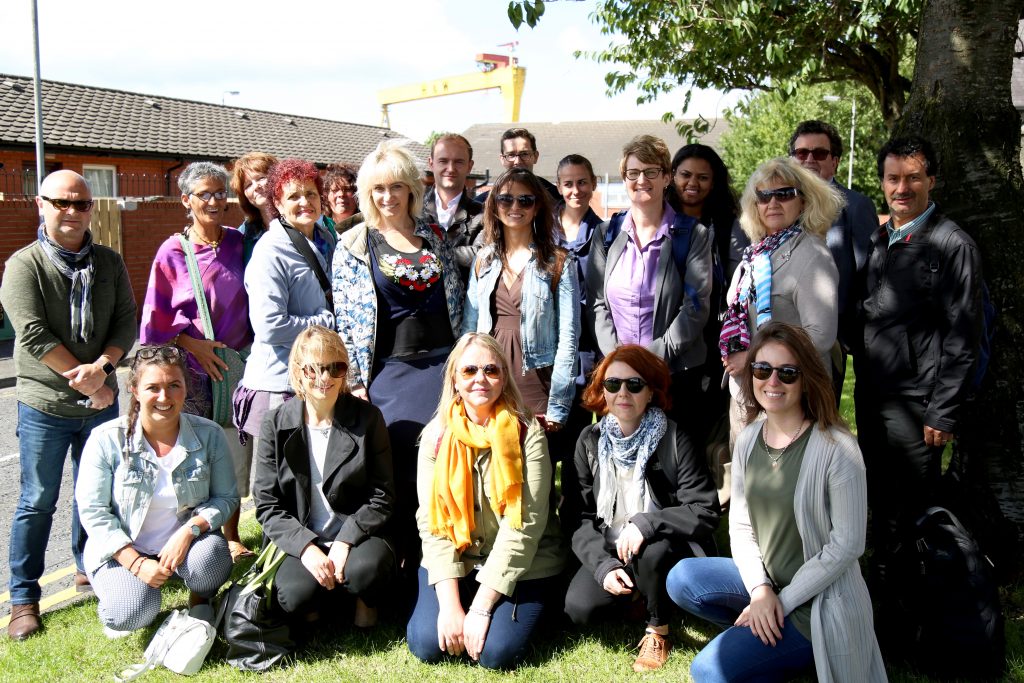How do we “sell” #ShiftThePower & build our influence? Reflections from the GFCF “Burning Issues” convening
18 Sep 2017

Burning Issues grant recipients tour East Belfast
If I had to describe the recent GFCF “Burning Issues” convening – hosted by the Community Foundation for Northern Ireland in Belfast – in a single word it would be INSPIRING. This word was used many times by participants during and after the meeting, which brought together organizations from around the world who have received a grant as part of the GFCF’s Burning Issues grants and learning programme. It was inspiring to be with a group of colleagues, soaking up their creative energy, and building relations that allowed for the fruitful exchange of ideas and solutions to many of the challenges we face.
Since my organization, the Tuzla Community Foundation, is running a project for community organizing focusing on Roma integration, it was very useful to find out about different approaches in similar contexts. My contribution to the meeting was to propose webinars on specific topics as a follow up activity and a way to continue to share knowledge and experience. Our first webinar will be held by our colleagues from Ukraine, who have set up an effective system for fusing together the IT and NGO world.
One of the common challenges all of us in Belfast seemed to share was connected to how to sustain our work and organizations and be better at “selling ourselves” through an effective communications strategy. That is why it was so useful to open up the discussion on how we reach and grow our stakeholders. By the end of the day, we had figured out that we invest too few resources, both time and money, into promotion, branding and communication tools. There was consensus that this is no longer the best way forward, and needs to be changed ASAP!
When we are in situations where we need to negotiate or advocate for the communities where we work, it is extremely important that we put ourselves and our organizations in positions of power and authority. How do we do that better as organizations looking for government support or perhaps exploring new partnerships from the private sector? We can be more successful in fundraising and advocacy, only if we have invested in an effective communication and branding strategy.
So, let’s imagine how this works: Imagine yourself in a supermarket, standing in front of a shelf looking for toothpaste. You see 36 different options and you want the best one, of course. However, you don’t want to spend a lot of money so you probably won’t reach for the most expensive one. What do we usually do? We take the one we have heard of. We don’t know if that’s the best we can get but it is probably good because people talk about it, and it’s widely advertised, so it should be a good choice. This is a material example of how important it is to position your company, organisation, product and its story in people’s lives.
In the same way, we should let people know about the good work we do, and about how we make the world a better place (that’s what we community based organizations do). Then, we can expect to have more partners who are willing to cooperate with us because they’ve heard about us, they know we are trustworthy and we can show results and impact. Our organizations do amazing, patient work, and bring positive changes on a grassroots level. Yet often, we are too modest and don’t do enough to share those stories of positive change. Once again, this needs to be changed!
So what is my conclusion? We have homework to do, and now need to “sell” #ShiftThePower to our PR managers! Many thanks to the GFCF and Community Foundation for Northern Ireland for hosting such a productive meeting.
By: Melisa Abadzic, Project Coordinator, Tuzla Community Foundation
About the Tuzla Community Foundation, Bosnia & Herzegovina Burning Issues grant
With the aim to help Roma integrate into the community and to better tackle the related environmental, economic and social challenges, the Tuzla Community Foundation is working in Kiseljiak to build trust and increase active participation in the community. Once a popular tourist destination, Kiseljiak is now one of the most neglected areas in the region. More than 10% of its population is made up of Roma, though due to deep cultural divisions they remain largely separate from the local population.
Starting with a 2016 GFCF Burning Issues grant, and continuing in 2017, the foundation aims to build the mechanisms for a more inclusive community. Over 2016, 50 individuals participated in developing the “Action Plan for the Development of the Kiseljak Community” for the period of 2017-2019 that brought together representatives from vulnerable groups including women, Roma and youth. The plan is to have the City Council officially accept the Action Plan to enable government, donor and investors’ funds to improve infrastructure (roads and canalization), environment (cleaning the mineral water spring and lake shore) and social life (construction of the community and education center for all citizens) in Kiseljak. Advocacy, along with a range of soft integration approaches, aim to empower the most vulnerable in the region, and to inspire a positive sense of the future.

